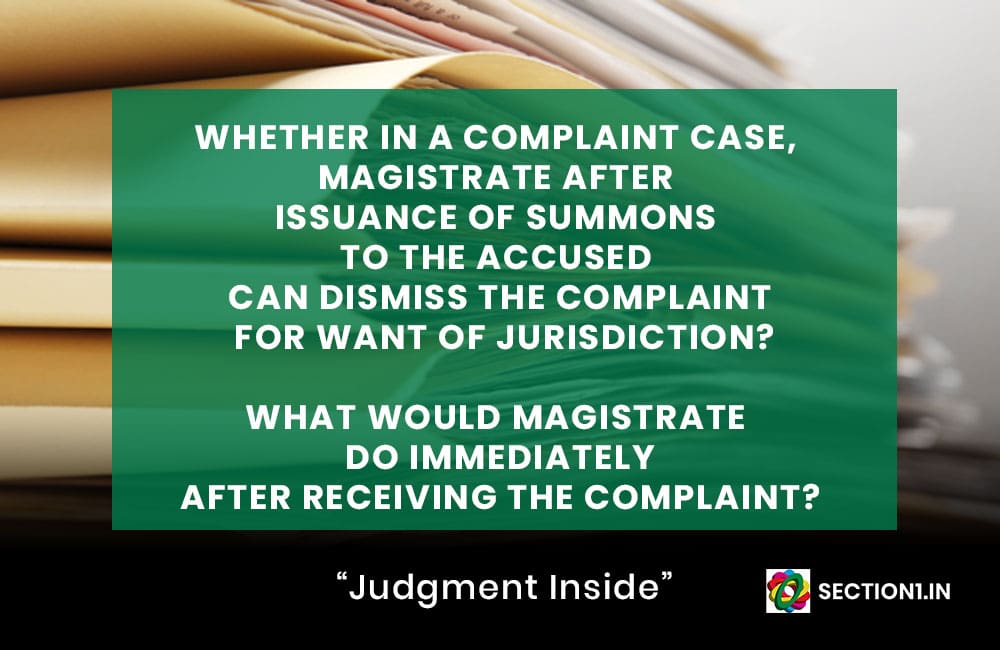8. The main questions involved in the present case are:
(i) Whether the Magistrate after having found sufficient ground for proceeding in case and issued summons under Section 204 Cr.P.C. has the jurisdiction to recall or review the order by exercising its power under Section 201 Cr.P.C.;
9. To decide the issue, it is necessary to notice the relevant provisions of the Cr.P.C. as discussed hereunder:
Chapter XV of Cr.P.C. relates to complaints to the Magistrates whereas Chapter XVI relates to commencement of proceedings before the Magistrates.
10. Section 200 of Cr.P.C. relates to examination of complaint. A Magistrate taking cognizance of an offence on complaint is required to examine the complaint and both the complainant and witness present, if any. On such examination of the complaint and the witness, if the Magistrate is of the opinion that there is no ground for proceeding, he has to dismiss the complaint under Section 203 Cr.P.C.
11. Section 201 Cr.P.C. lays down the procedure to be followed by the Magistrate not competent to take cognizance of the offence. If the complaint is made to a Magistrate who is not competent to take cognizance of the complaint he shall return the written complaint for its presentation before a proper court and if the complaint is not in writing, direct the complainant to move before the proper court.
12. Section 202 contemplates “postponement of issue of process” on receipt of a complaint in the circumstances mentioned therein. If the Magistrate is of the opinion
that there is no sufficient ground for proceeding, under Section 203 Cr.P.C. he can dismiss the complaint by briefly recording his reasons.
13. The commencement of proceedings before the Magistrate under Chapter XVI starts with issue of process under Section 204 Cr.P.C. If in the opinion of a Magistrate taking cognizance of the offence there is sufficient ground for proceeding, and the case appears to be a summons case, he shall issue his summons for the attendance of the accused, but if it is a warrant case, he may issue a warrant, or, if he thinks fit, a summons, for causing the accused to be brought or to appear at a certain time before such Magistrate or (if he has no jurisdiction himself) some other Magistrate having jurisdiction. No summons or warrant shall be issued against the accused under subsection (1) until a list of the prosecution witnesses has been filed. In a proceeding instituted upon a complaint made in writing, every summons or warrant issued under subsection (1) shall be accompanied by a copy of such complaint.
14. The aforesaid provisions make it clear that the Magistrate is required to issue summons for attendance of the accused only on examination of the complaint and on satisfaction that there is sufficient ground for taking cognizance of the offence and that it is competent to take such cognizance of offence. Once the decision is taken and summon is issued, in the absence of a power of review including inherent power to do so, remedy lies before the High Court under Section 482 Cr.P.C or under Article 227 of the Constitution of India and not before the Magistrate.
After quoting Adalat Prasad vs. Rooplal Jindal and others, (2004) 7 SCC 338 – 3 Judge Bench (para.15) the Apex Court has held as follows:
MAGISTRATE HAS TO DECIDE THE JURISDICTION IMMEDIATELY AFTER RECEIPT THE COMPLAINT: 16. Section 201 Cr.P.C., as noticed earlier, can be applied immediately on receipt of a complaint, if the Magistrate is not competent to take cognizance of the offence. Once the Magistrate taking cognizance of an offence forms his opinion that there is sufficient ground for proceeding and issues summons under Section 204 Cr.P.C., there is no question of going back following the procedure under Section 201 Cr.P.C. In absence of any power of review or recall the order of issuance of summons, the Magistrate cannot recall the summon in exercise of power under Section 201 Cr.P.C. The first question is thus answered in negative and in favour of the appellant.
PARTY: Devendra Kishanlal Dagalia vs Dwarkesh Diamonds Pvt. Ltd. and ors – Criminal Appeal nos. 1997 of 2013 (arising out of SLP (Crl) Nos. 2595 of 2013) – NOVEMBER 25, 2013.
URL: Download
Files : Download



